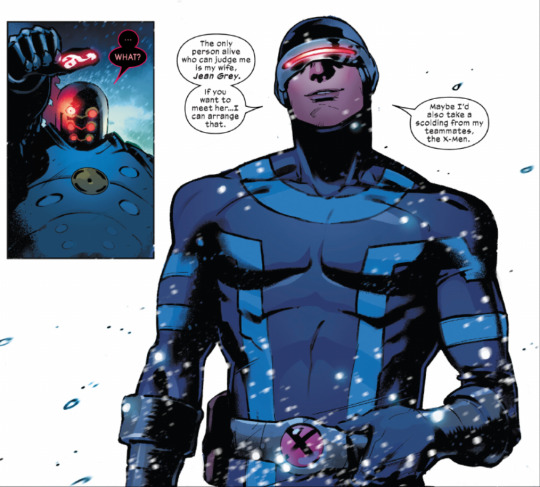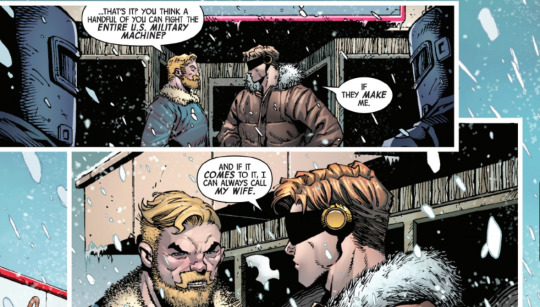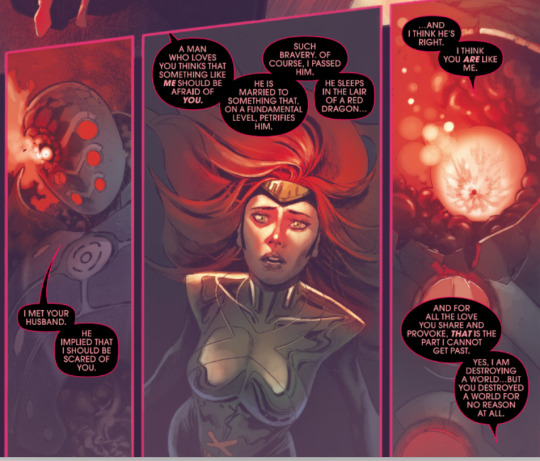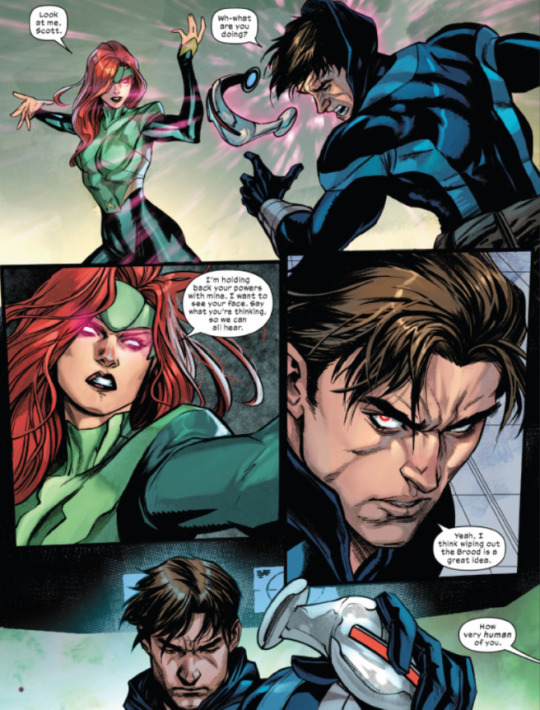#this might be an incredibly incoherent relationship manifesto
Explore tagged Tumblr posts
Text



(X-Men #14, Fall of the House of X #1, X-Men #1 - 2024)
So one of the things that I've been wanting to blog about since I went back to my origins to be a full on Cyclops-centered comics blog again, is how delightful (and maybe a bit delightfully dysfunctional) I find the modern Jean Grey and Scott Summers relationship.
You probably have an idea of where this is going already, given the number of top/bottom jokes I've made about the two. (Technically they're probably domme/sub jokes, but it's funnier to use the other terms. Also, I'm pretty sure they engage in telekinetic pegging.)
So I'm putting it behind a cut, because it's long and rambly, and with additional scans. But nothing in it should be a surprise.
Anyway it really is genuinely fascinating to me.
First of all, I'm very happy with the modern, and I think ORIGINAL, interpretation of the Jean Grey - Phoenix relationship, where the Phoenix is, always has been, and always will be, a part of Jean Grey herself. I always thought the possession/replacement story was unnecessary, and it's far more interesting to look at it as Jean all along.
But more importantly, given my focus, is that I'm delighted at how this has shaken out into this absolutely fascinating Goddess-Mortal dynamic between these two characters.
I chose the panels that I did for this post, because I feel like they really illustrate Scott's side of their relationship dynamic. You have poor Jean, who fears her power and what she might do, and constantly tries to atone for the damage she'd done in the past when she'd lost control of herself* (and I want to get back to the Dark Phoenix Saga, in a bit). And then you have Scott, whose reaction to the fact that his wife is maybe the most powerful being in the universe appears to be "my wife can beat up the entire universe, and it is fucking awesome!"
I mean look at these panels. The first one is from Judgment Day, a story that could prompt so much meta in its own right. We've seen how the Progenitor works at this point - he judges the vast majority of people and finds them wanting. A lot of times the root of his judgment seems to be based either on the character's own guilt and sense of failure (see e.g. Steve Rogers and Matt Murdock), or their complete apathy and disinterest in improvement (see: Charles Xavier). Scott seems like a sitting duck for the first kind of judgment: he IS prone to self-hatred and is haunted by his bad decisions and mistakes.
But he does something unexpected: he denies that the Progenitor has any right to judge him at al. He's willingly given that authority to only one person. And she's not here right now. And he PASSES.
Sadly, the Progenitor does end up throwing this back onto Jean during HER test:

(A.X.E. - X-Men #1)
Sadly, Scott's dead right now and not really able to clarify. But we as readers can go back and look at that top panel. That is not a man who is petrified of his wife. He may well sleep in the lair of the red dragon, but he LIKES it that way.
Basically, Scott Summers passed his Judgment Day test for being a massive submissive. And I love that.
And we see the "only my wife can judge me/would you like to meet her" thing again when Scott's on trial in Fall of the House of X.
And it's fascinating in context, because only a few issues before, he and Jean were on the outs, and she basically DOES judge him:

(It's probably wrong how hot I find it when she holds back his powers like that. It's like power-bondage or something.)
Anyway, this is from X-Men #23. In two issues, he'll be captured. She'll be DEAD. And everything goes straight to Hell. And yeah, they've implicitly resolved their issues before hand (since he's agreeing to leave the X-Men with her in Hellfire Gala), but it's still very sudden.
But in that panel, up there, he has no doubts at all. They were on the outs. She's dead. He's been tortured. And still, facing a kangaroo court, he's completely unwavering in his faith in her.
It's lovely.
Sentimentality aside, the key takeaway here is that he's not afraid of her. Even now, when she's fully integrated her power and is up in space re-igniting stars, he's not afraid of her. I'm actually not sure if he was even afraid of her in the Dark Phoenix Saga. Afraid FOR her, yes. And he certainly recognized when she lost it and tried to talk her down (and seemed to be succeeding, until Xavier interrupted!).
We do see, at one single point, Scott express any kind of feeling of inferiority to Jean. And that's in that truly delightful From the Ashes, Infinity storyline where, when she's freeing him from telepathic captivity, he shows her the hidden files in his mind - how he'd fantasized about them growing old together, and how he knows that won't happen now.

(I love the infinity comics, but it's so hard to blog with them, you know?)
But yeah, Scott's one point of vulnerability with regard to the inequality in their relationship has nothing to do with power. He just doesn't want to be forgotten.
So anyway, I included the last scan because, vulnerable issues aside, overall, he really does seem to enjoy the fact that his wife is the more powerful cavalry, who'll happily come to save and/or avenge him and is very happy to use that against anyone he wants.
It's cute and even a little childish in a fascinating way. "My dad can beat up your dad." Only it's wife, instead of dad.
(Look, I've already done the meta about Scott Summers dating people who parallel his many abusive father figures. The fact that both Emma Frost and Jack Winters have unbreakable diamond alternate forms ALONE...well...)
But we are talking about a man who hadn't really been a child since the day his parents' plane crashed, who bounced from abusive situation to abusive situation, without any hope of rescue (even from the father who was STILL ALIVE in space somewhere). It must be an incredibly heady feeling to be able to say, "YES, my wife is bigger than you and will ALWAYS come to save me."
It might be a bit of a gender subversion on the whole historical romance novel premise of the abused servant girl getting to run off with the warlord who would kill everyone who looked at her wrong.
(I also suspect there's an element of "Okay, fuck it. Everyone's blamed me for everything for so long, including me, that I'm just going to bend over and let HER punish me. And that's IT.")
As for what Jean gets out of the deal, well, she's got someone who will never be afraid of her, who admires every time she lets loose with her power, and thinks she's beautiful and amazing, and helps keep her connected with her past, her self and humanity, not by trying to rein her in, but by providing her with basic human comforts (like an unnecessary space ship), simply to make her happy.
Let's just hope that nothing ever happens to him. Because, well, as I've said before, the thing that most adaptations miss about the Dark Phoenix Saga, is that it's never been about a woman being too powerful for anyone's good. It's about a woman who gets repeatedly gaslit, manipulated, mentally fucked around with, who then watches the man she love get hurt and (apparently) die without being able to do anything about it.
...well, I'm a whump fan who likes seeing powerful ladies wreak havoc to rescue hurt and vulnerable men. So I know what I would like to see happen...
#scott summers#cyclops#jean grey#phoenix#this might be an incredibly incoherent relationship manifesto#I couldn't actually think of an ending for this so there you go#that man can't top a pool deck
75 notes
·
View notes
Text
Anyone who loves language might read a popular novel today and conclude that most professional writers don’t feel the same; the pages seem to turn themselves, and a well-chosen word, much less an unfamiliar one, is rare. Expecting readerly effort is considered elitist. To encounter Hazzard in this moment is to feel, paradoxically, relaxed: as she wrote in her manifesto-like essay “We Need Silence to Find Out What We Think,” she bestowed on “the accurate word” a huge power “in relieving the soul of incoherence.” I’ve come to think of her work as the inverse of the airy minimalism in vogue among fiction writers now. Where contemporary aphorists call on the reader to fill in the gaps of their fragmented narratives, often visually represented as white space, Hazzard manages to traverse incredible spans of time and emotion from sentence to sentence and paragraph to paragraph while fastidiously ensuring everything the reader needs to understand is there. The Transit of Venus is a novel of average length that nevertheless manages to encompass the entire lives and consciousnesses of at least four characters as well as depict changing social contexts across five decades in multiple countries. Hazzard accomplishes this not through evocative generalities or sexy suggestion, but with precision. Her writing requires the sort of sustained attention she believed art deserved, but her relationship with her reader is always reciprocal: she doesn’t create mystery but reveals its vital place in life. While she doesn’t purport to answer Why?, she understands that the magic of great fiction is in everyone, everywhere, asking.
Le Mot Juste, the soothing clarity of Shirley Hazzard, by Lauren Oyler
30 notes
·
View notes